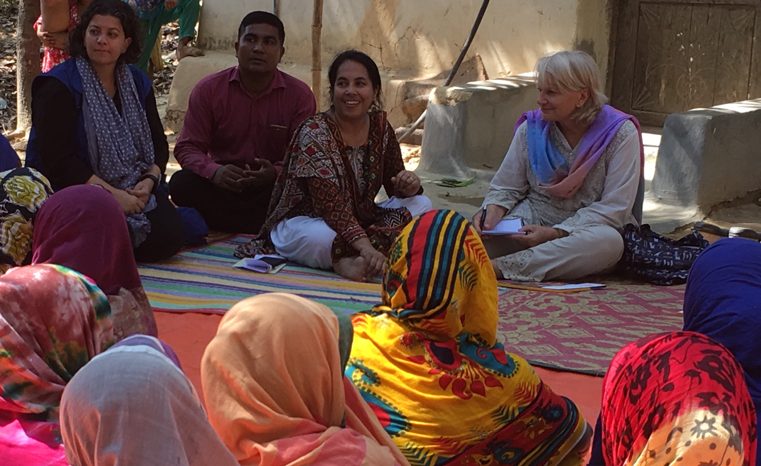In the lead up to the May Governing Council meeting, Dr. Sharman Stone, TC member and former commissioner on the IRAC, offers some reflections on the process.
Q: How did the TC function (logistically and practically) to deliver on the change agenda agreed in Delhi?
A: The Transition committee scope of work has required the most extraordinary investment of time and effort from a group of volunteers, driven by almost impossible deadlines and supported by some great IPPF staff and consultants. All of the volunteers have other occupations and some have significant carer responsibilities that they have had to juggle too. So why such an extraordinary effort? I suspect it is because we care devoutly for the IPPF mission: the delivery of SRHR and services, advocacy and CSE to the worlds most disadvantaged and in-need.

The rights of women to control their bodies and their reproductive health is under increasing threat. Not only was significant funding withdrawn by the USA under their Gag Rule, there has been widespread push-back of women’s rights in many parts of the world as conflict rages and religious fundamentalism reasserts itself. The COVID-19 pandemic has crippled service access, and some governments have seized the opportunity to reassert their opposition to women’s movements and access to contraception, safe abortions and life saving information.
The consistent and indefatigable TC chairing of Andreas Prager should also be acknowledged, he is unflappable and always available.
It is also worth noting that, by committing to designing, refining and delivering the reforms, including interviewing the candidates for the new BOT and NGC, this small band of volunteers have rendered themselves ineligible as a candidate for any of the decision-making positions in the new Federation. Their work is therefore truly selfless, motivated solely by the need to see the Federation survive and deliver its mission.
Q: What has been the greatest challenge the TC has faced?
A: The TC has communicated through different time zones, via countless zoom meetings, WhatsApp conversations, emails and one face to face meeting in Malaysia. It has not been easy. The challenge of different time zones invariably means someone on the call has a close to midnight, or very early time contact on the following day. There have been huge volumes of often highly technical reading material to digest in very short time frames. These difficulties have been borne with good grace and a maximum effort to accommodate those with a different perspective, although it has been remarkable how readily consensus has been reached on all things not still a work in progress.
Q: What are the top themes/priorities that you have seen throughout this journey to reform?
A: I have also focussed on the RAST (Resource Allocation Support Team), the working group tasked with further developing the new IRAC resource allocation framework and processes for core funding. This new framework introduces a significant departure from the current model, which caused much contention prior to the decision to reform. The old allocation formulae and processes were not transparent, consistent, always fair or rational.
We are on schedule to deliver the new three stream process as per the agreed timeframe, which means the GC and the new Board of Trustees will not be delivered a recommendation to accept a finished model, but rather will be invited to consider the streams 2 and 3 process and criteria, with stream 1 still under development. This work has been a very time consuming and difficult challenge. Its successful delivery however will be key to the delivery of the Federation’s mission, to the sustaining of the MAs, large and small and is essential for the ongoing support of donors.
As the only member of the IRAC (the resource allocation commission) on the TC the top themes or priorities for my work have therefore been the shepherding of the Resource Allocation Support team (RAST) made up of widely dispersed strongly committed IPPF staff. The aim is to complete the development of the IRAC framework into a new fair, transparent, responsive, innovation supporting core fund allocation process that leaves no one behind. Given the variation in MA circumstances, size, capacity and focus, this is no easy task.
Q: How do you feel about this upcoming GC meeting?
I am disappointed that a global epidemic stymies our chance to meet face to face this year to transition from the GC to the new BofT. GC member (including those in the TC) have had such challenging and often harrowing times together. The May 2019 GC meeting was extraordinary in the energy generated to push through reforms for a Federation which was so close to collapse. The donors were magnificent, in their encouragement, patience and ongoing support, despite the time-frame set to produce a new governance architecture and resource allocation model that many thought was simply impossible to deliver. The GA meeting in New Delhi at the end of 2019 was extraordinary in the expectations generated and met. The chairing by Helen Clark was also inspiring and resulted in her managing a consensus across so many countries and contexts. Old resentments and confusion were pushed aside to be replaced by enthusiasm, often led by the youth, but also deeply felt by volunteers who had dedicated a lifetime to the cause and to the Federation.
It would have been so wonderful to have been able to physically embrace, laugh and cry with my GC colleagues as we sign off and hand over to the new regime in May. This will now have to be virtual, but I have made life-long friends in the process, and I am in awe of the contribution of my fellow TC volunteers who can truly claim to have played a pivotal role in the reformation of the IPPF. It can now go on protecting the rights and lives of women and girls around the globe, it has been an honour and privilege to serve them.